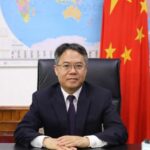ISLAMABAD, Aug 29 (APP): Minister for Interior Prof Ahsan
Iqbal Tuesday here said economic progress in Pakistan could be
ensured with political stability and by forging a closer partnership
with China.
Speaking at a seminar on “Establishment of CPEC Consortium of
Business Schools” at National University of Science and Technology
(NUST), he said if the country lacked political stability, no kind
of policies could ensure economic progress.
He said China had created prosperity and became engine of
economic growth by maintaining political stability.
The minister said CPEC was not just projects of roads and
energy but it would help Pakistan graduate to another level of
industrialization and development.
“Aim of CPEC is to bring structural transformation in the
economy of Pakistan. Pakistan must graduate from an agrarian economy
to industrial economy.”
He said consortium of business schools of Pakistan and China
was another step towards realization of CPEC that would start a new
era in the region.
Ahsan called China the most trusted friend of Pakistan. “In
the last 70 years, China has never disappointed Pakistan. China has
approval rating of 91 per cent in Pakistan, which is the highest in
the world. Chinese have similar sentiments towards Pakistan.”
Ahsan said in 2013, the world was shy of Pakistan as
its economy was under stress, energy shortages were 20 hours long
and its security situation was bleak.
However, he said since 2013, the government worked hard and
considerably reduced the energy shortages and broke the back of
terrorists and brought peace to the country.
He said $36 billion worth of CPEC projects were energy
projects based on hydel, coal, solar and wind energy, adding coal
projects were based on super critical technology that was clean
technology.
The energy projects could not only be environmentally friendly
but would also bring down the cost of electricity, he added.
Ahsan said in 1980, China had a per capita income of $ 200
while Pakistan had per capita of $ 300 but now China leapt to per
capita of $ 8,000 while Pakistan was left behind at $ 1,500.
The minister said China was not only the world’s biggest
exporter but also the second largest importer with imports of $ 1.3
trillion and Pakistani entrepreneurs and businessmen could avail
trade opportunities by learning more about the Chinese economy.
Pakistan could be the world’s 25th biggest economy by 2025 and
this fact was validated by PricewaterhouseCoopers, he said, adding
Pakistan could be the world’s 20th largest economy by 2030 by
continuing with the right set of policies.
He said Gwadar port could be an alternative to China’s South
China Sea route and could also provide trade routes to Central Asian
states and become part of new supply chains.
Political stability path to economic progress in Pakistan: Ahsan






